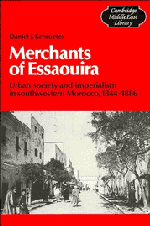Book contents
- Frontmatter
- Contents
- List of illustrations
- Map 1 General map of Morocco
- Preface
- Notes on usage
- Abbreviations
- Chronology
- 1 Introduction
- 2 The royal port
- 3 Merchants of the Sultan
- 4 Port and bazaar
- 5 Beyond the walls
- 6 The politics of trade
- 7 Foreign intervention and domestic reforms
- 8 The struggle for the southwest
- 9 The people of Essaouira in precolonial times
- 10 The end of an era
- Appendix A Corcos collection: nineteenth-century Arabic documents (1843–83)
- Appendix B Population estimates of Essaouira
- Appendix C Balancing revenue and expenditure: accounts of the port
- Appendix D Trade statistics for Essaouira
- Notes
- Bibliography
- Index
- Frontmatter
- Contents
- List of illustrations
- Map 1 General map of Morocco
- Preface
- Notes on usage
- Abbreviations
- Chronology
- 1 Introduction
- 2 The royal port
- 3 Merchants of the Sultan
- 4 Port and bazaar
- 5 Beyond the walls
- 6 The politics of trade
- 7 Foreign intervention and domestic reforms
- 8 The struggle for the southwest
- 9 The people of Essaouira in precolonial times
- 10 The end of an era
- Appendix A Corcos collection: nineteenth-century Arabic documents (1843–83)
- Appendix B Population estimates of Essaouira
- Appendix C Balancing revenue and expenditure: accounts of the port
- Appendix D Trade statistics for Essaouira
- Notes
- Bibliography
- Index
Summary
Essaouira was the most important seaport in Morocco for a century, but compared with the growing port cities in the colonial area, this outlet to Europe was a backwater. Essaouira remained a small city, situated in a relatively barren region. The expansion of other Middle Eastern seaports, such as Beirut and Alexandria, was dramatic in the same period. Beirut's population grew from 6,000 to 120,000 in the nineteenth century. At the beginning of the nineteenth century, Alexandria had a population of 10,000; already by the mid 1850s, the city had grown to about 150,000. Wherever European commercial interests were strong, port cities began to grow into major emporiums of trade. In contrast, Essaouira's small scale growth from 10,000 to 18,000 seems insignificant (see app. B).
And yet, historians have often seen the development of Essaouira as highly significant in the modern history of Morocco. Abdallah Laroui argues that Sultan Muhammad III, the founder of Essaouira, can be regarded as the ‘veritable architect of the “modern” Morocco described in numerous nineteenth- and twentieth-century accounts’. With the creation of Essaouira, in Laroui's view, the bulk of the state revenues were henceforth derived from customs duties on foreign trade. In this way the prosperity and the very existence of the state became dependent on an activity dominated by foreigners.
- Type
- Chapter
- Information
- Merchants of EssaouiraUrban Society and Imperialism in Southwestern Morocco, 1844–1886, pp. 1 - 6Publisher: Cambridge University PressPrint publication year: 1988

